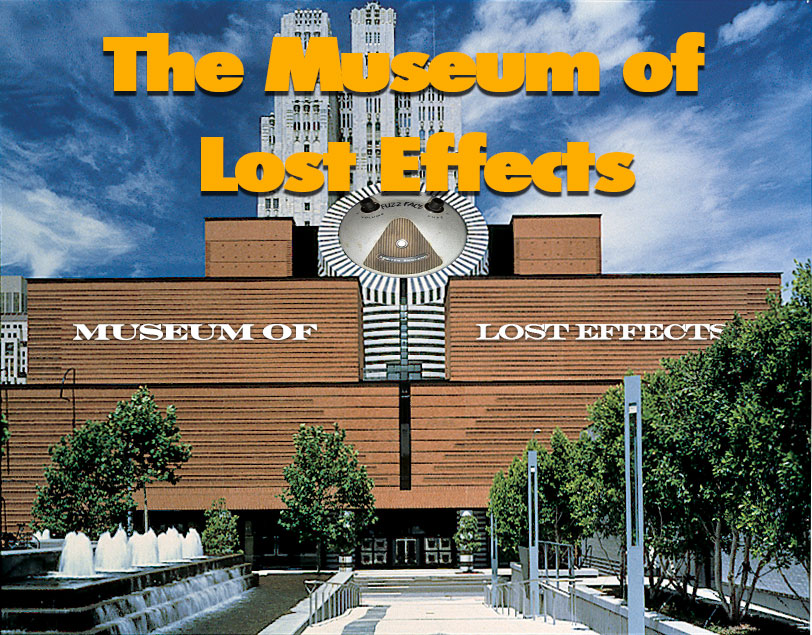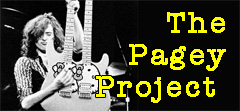
Premier Guitar just posted my latest recording column. It focuses on the “Multitrack Masters” recordings and other illicitly leaked audio files that deconstruct classic rock recordings into separate tracks with each instrument isolated.
This essential listening is thought-provoking for many reasons. The two that fascinate me most are a) what secrets these recordings reveal about the craft behind great rock records, and b) how they highlight some of the back-assward notions that underlie our laws governing copyright and intellectual property. I think it’s fascinating stuff, and I hope you agree!
Have you guys investigated any of this material? What are your observations?








So much material out there ? I have no idea where to start or even what to say about the whole tangled web of greed that is the music biz.Nice article Joe , I know it hurt your brain to figure out how to write that without saying some nasty stuff.They say there are 2 types of people Us and Them , I still see only me. Too early to think straight more coffee and I will do some listening later , stay safe and have fun !
Listening to a lot of multitracks has been incredibly helpful in my ongoing learning. A single listening session is worth months of digging thru vague forum posts by anonymous, well meaning, often utterly clueless hobbyists. My take-aways:
– Everything is brighter in isolation than what it appears to be, once it’s EQ’d to sit just right. A mix sounds ‘full’ only in context. As a corollary, reharsal room style guitar and bass sounds that have that gratifying bass thump are antithetical to getting working recorded sounds.
– More importantly, there are infinite ways of shaping sounds into a mix and fitting parts into an arrangement that simply don’t work, just a few that do, and it’s easier to absorb that by imitation and example than by being lectured about the theory of it. The big surprise to me was how much of this translates across different genres and musical eras, regardless of gear. We’re sort of conditioned to consider relatively small nuances as polar opposites, but pick ten random drum tracks from the available multitracks, and at least to my ear they’ll share some unmistakable traits that make them … work. Same for everything else.
– Tight modern rock guitar playing is almost mechanical, but never robotic. Dig the rhythm guitars on Alice In Chains’ ‘Them Bones’.
– Krist Novoselic FTW. The bass tracks on Nevermind are just immaculate, flawless.
– Quality songwriting transcends all. Mute the vocals, and a lot of the classics take on a lovely, “neoclassical ditty” feel. Best example, probably Oasis’ Wonderwall.
– Favorite ‘whoa!’ moments: the bass track on the aforementioned Them Bones. The trippy delay freakout on the vocals of Jane’s Addiction’s ‘Stop!’. The utterly crushed guitars on Highway Star (vintage ‘vibe’ overcompression!).
Thanks, F, for your exceedingly astute and thought-provoking observations! (And thanks for calling out points of interest on the ’90s material, while I focused more on the ’60s and ’70s stuff.)
Thanks! I had some time to really think that through. I teach engineering to some students, and now multitracks analysis starts on the first lesson, in parallel with the usual geekery about compressor curves and such. It’s made everything much more effective.
Seriously – it’s kind of a big deal. Before that stuff surfaced the only way to get such an experience was to intern at a world class studio, or something like that. It’s like finding a treasure trove of 60-some years of accumulated knowledge about the craft of making hit records, with “Hey, THIS is how the big boys do it!” written on the lid.
I forgot another important point in the previous post: I was pretty surprised at how unremarkable the actual tones are most of the time, with the real magic happening in the arrangement and performance department. Again, having such a frame of reference is invaluable.
I definitely think it would be cool if there was an incentive for studios to release the isolated tracks. Perhaps under a restrictive license. I also think people whole pay for the privilege of listening. I would. Like everyone’s saying, there’s a lot to learn from the parts, at every level from the performance, to the recording technique to the mixing, that you can’t get from the whole mix.
Would be a transcribers dream to have all tracks available like this with the guitars all isolated. Listening to Hendrix’ ‘3rd stone From The Sun’ is awesome indeed!
Yeah, I find that Hendrix cut particularly inspiring. It just feels less “super-human” than his mixed tracks, but in a cool way. I get more of a sense of him as a human being — his hands, his articulation, the tiny imperfections. As opposed to “Jimi the Eternal Guitar God,” you know? It bring him down to earth for me in a deeply moving way.
Definitely Joe. What it reminds me of is what a musician he was. His chord playing was just the best and the rhythm second to none. A lot of people think of Jimi and think fuzz face and screaming lead playing. Good to remind folks of the whole chordal side that he did so well. I think i like that side of him more than the super cranked side. Castles made of Sand and stuff like that are just immense.
Absolutely! And that has a lot to do with why I idolize Curtis Mayfield. Jimi is definitely channeling Curtis on songs like that. And the title track from Electric Ladyland is almost literally Curtis on acid!
Ahh! Joe! You think along the same lines i do and you’re right Jimi was way influenced by Curtis; from the clean chordal stuff to the kinda falsetto vocal on EL. Curtis had such a cool vibe goin’ on. Tracks like “Pusherman” and “Move On Up” i really like a lot.
nicely handled in the article Joe.
A. I love listening to these recordings and there’s definitely a lot to be gleaned from them. My main thoughts when listening are often about the performer-medium relationship. I cut my studio teeth during that bizarre transition period of the late 90’s when we were primarily using MDM/ADAT and therefore had the pain of tracking to tape and the challenge of figuring out how to make things sound musical and textured in such a clean digital environment. I still remember the audience buzz at the NAB rollout of ProTools 3 which finally put all the pieces together. Sorry for the ramble, but my point is that I love listening to these recordings and noting the technological frame in which they were made. I don’t miss spending 2+ hours per instrument setting levels and effects, but I do appreciatively miss the preparation and forethought that was required to select and commit to a sound/performance in the era of destructive editing. What each of these ‘hits’ demonstrate is the artistry required by everyone involved to know how tight/loose/trebly/etc each part needs to be to pull off the desired end effect. We’re now in the era of endless expression possibilities with limitless effects, edits, overdubs, etc. While this doesn’t inherently preclude artistry, it certainly makes it easier to fake it. So I think what I love most is just enjoying the solid individual performances and remembering that wonderful feeling of finishing a take and yelling, “great, next!”, rather than, “I think I can work with that!”.
B. From an academic/education standpoint, I fully agree that these tracks need to be archived and available. The age-of-legacy is harder to determine though. The only real issue that a band needs to worry about is the modern DJ crowd sampling/incorporating the isolated tracks without proper attribution. They already do it, but this makes it too easy for them. You’re right that current copyright law only protects those who can afford lawyers, but I can’t, so that’s all I’ll say. 🙂
I am a pretty much lifelong Cure (and Simon Gallup) fan..but that bass track on “Just Like Heaven” in isolation…jiminy Christmas. Simon’s playing is fine,but who in their right mind let that go out the door? The lowest note is sooooo farty. Yeesh.
If you think Simon’s “Just Like Heaven” low E sounds farty, you should hear my try to play it on MIDI guitar/looper!
Reminds me of a friend who remixed some old New Order. He pulled up Bernard’s vox fader and shouted, “Jesus Christ! You call that your lead vocal?” 😉
Ha! The amazing thing is how, in context, it sounds fine. That song in particular, though…it really goes to show how much what you perceive as bass is guitar and kick drum.
Love seeing how they bounced the Sgt Pepper’s tracks – although it sadly doesn’t get you the full isolation on every input. The brightness of the guitars appeals to me and IMO sounds just like they do in the mix. They just occupy that space alone leaving room for the orchestration and vocals.
Another great article Joe. Just recently had to learn the bass part for Duran Duran’s Hungry Like the Wolf. The syncopated feel that fits so well in the mix just sounds completely off and weird in isolation. You also hear how the track is gloriously sloppy in a good way. I heard the whole song differently after listening to that isolated track.
It’s kinda like analyzing the Mona Lisa using paint by numbers. I’m surprised nobody thinks the artists should be compensated for it. I do!
The artists/record companies/publishers have all been compensated quite handsomely for the guitar hero/rock star tracks they supplied, which constitute the bulk of the ISO tracks available, if I purchase the games with the DVDs & I figure out how to extract the separate tracks, not to resell, but for education, ear training/production tips etc. why should I pay again? I agree that anybody who sells these tracks is violating copyright & should be held accountable, but I’d go one step further & ask the record labels to release ALL multitracks still in existence on a website based on the Apple music format, for a monthly fee of $10-$20, giving bands a fresh revenue stream, I’d pay that, maybe even a little more, they are that useful for aspiring & veteran creatives alike, plus they’re more fun than a barrel full of monkeys! They’d live on the servers & would only work on one computer & expire when you cancel subscription, if they can fit 30 or so songs on a DVD in.mogg format, the site would not be horrendously bandwidth greedy, just a thought …